- Using Rituals as Well as Routines for Productive Creativity, guest post by Paula Chaffee Scardamalia
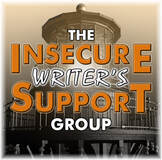
Rebecca Douglass, Liza, and
Beth Camp. I'm skipping this month's optional question, but wishing the IWSG community Happy New Year!
|
Happy New Year! To start off 2025, I'm sharing the best of last year's writing and productivity blog posts. Enjoy!
 Every month, the Insecure Writers Support Group hosts a blog hop with an optional question meant to inspire and encourage other writers. Special thanks to founder Alex Cavanaugh and to this month’s co-hosts, Natalie Aguirre, Rebecca Douglass, Liza, and Beth Camp. I'm skipping this month's optional question, but wishing the IWSG community Happy New Year! Quotes from 2024 posts:
If an Object in Motion Stays in Motion, How Can We Make It Easier to Begin the Motion of Writing?9/4/2024
 Every month, the Insecure Writers Support Group hosts a blog hop with an optional question meant to inspire and encourage other writers. This month, I’m happy to co-host along with Beth Camp, Jean Davis, and PJ Colando. This month's question: Since it's back to school time, let's talk English class. What's a writing rule you learned in school that messed you up as a writer? I don’t remember any particularly bad writing rules, but I do remember hating homework with a specified word count. If I reached 290 words of a 300-word assignment, I would add “very” ten times. This didn't strengthen my writing, and since the homework was written by hand, the additional words were probably, in hindsight, unnecessary. (I can’t imagine the teacher manually counting each word.) Luckily, this technique didn’t result in any very bad writing habits. 😊 Writing Productivity: Overcoming Inertia  Because of the school schedule, September still feels like the beginning of the new year to me, even more so than January. The fall is a great time to assess writing habits and patterns with an eye to becoming more creatively productive. Sometimes I struggle with getting started for the day. One of Isaac Newton's principles is that an object in motion tends to stay in motion. If that's the case, how can we make it easier to begin the motion of writing? One idea is to set a timer for a short amount of time. (Ali Abdaal recommends five minutes in Feel Good Productivity. I tend to use fifteen.) When the timer ends, give yourself permission to stop writing if you want. But more sessions than not, it's easier to keep going once you overcome the inertia. "The idea behind the rule is that taking the first step is often the most challenging part of any task," Abdaal says. Another idea is to leave your future self story bread crumbs. Some writers recommend stopping when you know what happens next to make it easier to begin again. But if you're not sure what happens next, try making a list of questions about the characters or plot that you need to explore. (How did two characters in a relationship initially meet? How does the main character feel about different people in their family?) My questions tend to be story specific, but you can also use a character questionnaire. I print the questions on slips of paper and put them in a bowl. If I’m stuck writing, I pull a question and focus on a scene that answers it. You can put writing prompts on the slips of paper, too. I find that the random nature of choosing a question brings joy to the process. Another idea is to join a Zoom writing session where you log in to write at the same time as other writers. After a brief intro, you typically turn off your camera to write, then check back in at the end of the allocated time. Writing with others can help get over the hurdle of beginning.  Question bowl and candle with matches Question bowl and candle with matches Once you begin, fighting against distraction is another problem. I often light a candle as part of my writing ritual. Personally, this helps me keep my butt in the chair, because I won’t leave the burning candle. That means no snacks or laundry breaks during the focused time. I also recommend keeping a notepad (or document) nearby to track all of the things that invariably pop into your head. Research can often be done at a later date, and having a place to save ideas keeps you focused on the actual task at hand. (Recent thoughts on my notepad included: What sandals are most comfortable for long walks? Do we still have paint to touch up the kitchen? I need to buy more candles....) If you're tempted to go online during writing time, putting your computer in airplane mode can help. Lastly, track time, not words, especially during revision. Revision means wordcount often goes down. And for me, tracking wordcount can lead to rushing through the writing to reach the goal. But if I’m going to work for two hours regardless of the wordcount, I might as well do my *very* best work during that time. Happy September!
Feel free to share your own tips for getting started in the comments. This month's productivity advice comes from author Natalie Zaman. Thank you, Natalie! 5 Tips to Make Room for Writing When You’re Busy Beyond Reason If you’re anything like me, writing is not all you (must!) do. I say must when it comes to my writing because, like so many creative outlets, it saves me. The act of writing reminds me that even if it’s garbage, I can a) do a thing, b) finish a thing—both of which are important to feeling accomplished and worthy to yourself (the most important person to please). That said, finding time to write when you’re raising a family (this does not end, empty nest or not), working full time, and, you know, just trying to live and enjoy life isn’t the easiest. Here are some techniques that work for me:
Hugs! Nat ♥ More about Natalie:  Arts and history advocate by day and magical writer by night, Natalie Zaman has been exploring mystical practices for decades. An avid Tarot-reader and storyteller, she is the author of the award-winning books, Color and Conjure and Magical Destinations of the Northeast (Llewellyn), the co-author of several young adult fiction books, and a regular contributor to Llewellyn’s annual publications. Curiously, she shares a birthday with her home state of New Jersey, though she is a bit younger.  Natalie's latest book is Social Media Spellbook, coauthored with Amy Blackthorn, and available for preorder now. Description: "Social media is part of our lives, and it’s an increasingly popular place for witches of all kinds to meet and create new spells. On TikTok, Instagram, Twitter, and more, witches set intentions, manifest their dream jobs, and even create virtual altars for their ancestors. Social Media Spellbook is a perfect way to take part in this trend by using social media to channel the power of the universe. Authors Amy Blackthorn and Natalie Zaman propose adaptable formulas that draw on symbolic imagery, astrology, tarot, herbs, and crystals—not to mention everyday desire—in a spell-a-day format that anyone, even a beginner witch, can use." IWSG Blog Hop  Every month, the Insecure Writers Support Group hosts a blog hop with an optional question meant to inspire and encourage other writers. Special thanks to founder Alex Cavanaugh and to this month’s co-hosts, Feather Stone, Kim Lajevardi, Diedre Knight, C. Lee McKenzie, and Sarah - The Faux Fountain Pen. This month's question: Do you use AI in your writing and if so how? Do you use it for your posts? Incorporate it into your stories? Use it for research? Audio? Other than spell and grammar checks, I don't use AI, but I look forward to reading other IWSG blog hop answers. Until next month,
Happy Writing! This month's productivity advice comes from author and writing coach Paula Chaffee Scardamalia, discussing routines and rituals. Thanks, Paula! Using Rituals as Well as Routines for Productive Creativity by Paula Chaffee Scardamalia In our living and ever-evolving language, the original meaning of some words changes over time, perhaps losing impact and significance. Examples of this are ritual and routine. Because of an element both have in common, repetition, ritual and routine are often used interchangeably and incorrectly, thereby losing their power and significance. In a dictionary, you discover both words have the idea of a repeated act or procedure as one of several meanings. But look at the words themselves and you see how different from each other they truly are. Mindless Routine Routine, from the French and spelled the same way, means “usual course of action, beaten path,” from its root, route, meaning way, path, or course. A routine is a path or course of action that you repeat or travel over and over again. And so, routine can turn into a rut. After all, a well-traveled path does, after a while become an actual rut. A well-traveled path, though, as any hiker or dedicated walker can tell you, is easy to follow. Signs aren’t necessary. Stones, or other debris have either been removed or ground down by the constant tread of feet, and the path is relatively smooth. Risks or challenges along the way are known and can be avoided or prepared for. Routines are given a bad rep, because you might get too comfortable in them and because they might make you and your life—and/or writing—boring. But… Routines are necessary. In personal life, work life, and in your creative life. Like that well-traveled path, routines are easy to follow, require no direction, seldom trip you up and help you avoid risks. Routines, because of their repeated set of actions allow your brain and body to put energy into other things, like writing, and help you use your time more effectively. Morning routines, go-to-bed routines, drive-to-work routines and many others, all make life easier. You don’t want to spend time and brain power trying to decide whether to take a shower first and then have breakfast, or have breakfast and then a shower. Instead, you develop a morning routine, a set of actions in an order that doesn’t require thinking or even much attention. Ever driven a car to work or some other frequently visited destination only to realize you don’t really remember getting there? The routine of that well-traveled path doesn’t require much thinking or decision making any more, you don’t have to read road signs or wonder if you are heading the right way. Routines make life easier and more efficient, because you don’t have to think about your actions any more, saving time and brainpower. When routines are disrupted, it is then you discover just how much you value them...long for them even. But a full life comes with disruptions to routines. Sometimes returning to them is easy, but sometimes the return is harder and slower. And sometimes, you return to those paths changed.
Mindful Ritual Rituals, unlike routines, are more about mindfulness than mindlessness. Deriving from the Latin word, ritualis, relating to (religious) rites (from ritus, “rite”, religious observance or ceremony), the word ritual implies a set of actions having to do with the transcendent or sacred. The more formalized version of ritual, of course, is that found in church and temple. In current usage, ritual is relegated to either the less personal heights of church or temple, or reduced to the equivalent of routine. But simple rituals you design yourself are the means for adding depth, focus and awareness to your writing life. Use your creative mind to design rituals for transitions into creative work and out again, or bigger events such as the hanging of a show or the launching of a business. While there may be a pattern of repeated actions in these types of rituals, the purpose of the enacted patterns is to bring a mindfulness to the moment. To enhance and empower your creative work, look at where you might create rituals to:
To increase your productivity along with creativity, observe your routines and how you might use a routine to your creative advantage, and then design one or two simple rituals to connect you with inspiration and help you dive into the writing waters.  More about Paula: Paula Chaffee Scardamalia is a book coach, dream and tarot intuitive and the author of Enchanting Creativity: How Fairy Tales, Dreams, Rituals & Journaling Can Awaken Your Creative Self. She also wrote the award-winning Weaving a Woman’s Life: Spiritual Lessons from the Loom, as well as Tarot for the Fiction Writer, and her novel, In the Land of the Vultures. For more than 20 years, Paula's presented workshops across the country for national and regional Romance Writers of America and other writing groups’ events, both online and in person. Paula offers both book coaching and editing services for fiction and nonfiction writers, using both her practical experience and intuitive tools where appropriate. You can find out more at Divining the Muse. IWSG Blog Hop  Every month, the Insecure Writers Support Group hosts a blog hop with an optional question meant to inspire and encourage other writers. Special thanks to founder Alex Cavanaugh and to this month’s co-hosts, Liza at Middle Passages, Shannon Lawrence, Melissa Maygrove, and Olga Godim. This month's question: In this constantly evolving industry, what kind of offering/service do you think the IWSG should consider offering to members? I'm happy with the sense of camaraderie that IWSG creates, so I don't have any suggestions. I'm interested to read what others have to say in the blog hop. Until next month,
Happy Writing!  Today's productivity advice comes from Jen Breach, author of more than thirty books. But first, the IWSG Blog Hop. Every month, the Insecure Writers Support Group hosts a blog hop with an optional question meant to inspire and encourage other writers. Special thanks to founder Alex Cavanaugh and to this month’s co-hosts, Victoria Marie Lees, Kim Lajevardi, Nancy Gideon, and Cathrina Constantine. This month's question: How do you deal with distractions when you are writing? Do they derail you? One of the best ways I've found to avoid distractions is through creative immersions and writing retreats, and I've blogged about their benefits before. I recently helped facilitate an amazing retreat at the Highlights Foundation called Writing Through Trauma to Empower Readers. But a retreat is a special event, not a weekly occurrence. On a regular basis, I deal with distractions by grouping tasks (like running errands, making phone calls, or responding to email) together during one part of the day. I'm also a fan of setting a timer for writing (with no other activities allowed). Sometimes I purposely leave my phone in a different room. And lighting a candle is a butt-in-chair guarantee. I can't leave the candle unattended! Distractions tend to be a short term problem. What about the long road? Thanks to Jen Breach for the guest post tacking this topic. Embracing the Long Road: Productivity Guest Post by author Jen Breach You know what works for lots of people? Setting daily writing goals. Four hundred words a day, two hours each morning before work, that sort of thing. Not me, though. My lil brain will go blank under the influence of strict rules, despite the best productivity intentions of routine. I need to follow whims of excitement and energy, within the bounds of deadlines, of course. But I am not a rudderless ship, a stringless kite, a spiral-flying balloon with the air thpthpthpthping out of an uncinched neck. I just keep a longer creative view than day to day. Month to month suits me better. At the end of each month my trusted accountability crew and I share process letters. They are letters of reflection and gratitude, where self-awareness and honesty are celebrated. They go like this:
It never fails to surprise me what I have done in just a month, and the community who helped me get there one more time. And it never fails to inspire me to get my butt back in the seat and my fingers back on the keyboard. Writing is a long road, and counting in months makes sense to me.  More about Jen Breach: Jen Breach (they/them) is a queer, nonbinary writer of 30 picture books, chapter books, and graphic novels for kids, including an eight book series featuring the first nonbinary main character for the age group, and a nonfiction about the politics of global foodways, which won a Junior Library Guild gold standard selection.  Their latest book is Solstice: Around the World on the Longest, Shortest Day, in which we visit 14 children on June 21, summer solstice in the Northern hemisphere and winter solstice in the South. It's illustrated by 14 global artists, who illuminate their home countries with heart and authority. The IWSG Blog Hop 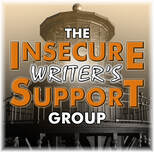 Every month, the Insecure Writers Support Group hosts a blog hop with an optional question meant to inspire and encourage other writers. Special thanks to founder Alex Cavanaugh and to this month’s co-hosts, Janet Alcorn, T. Powell Coltrin, Natalie Aguirre, and Pat Garcia. This month's question: How long have you been blogging? (Or on Facebook/Twitter/Instagram?) What do you like about it and how has it changed? My very first blog post was on Halloween in 2013. I can’t believe it’s been ten years! At the time, I thought I would focus on writing resources (a solid idea) and blog twice a week (oh, silly me). I ended my first post with a slightly blurry photo of our Westie, Rocky, and our Schneagle, Luna. (My mom commented about the photo (left) – where are Luna’s eyes?) Sadly, Rocky has since passed away. Here’s a current photo of Luna (right) with better lighting. :) These days, my monthly blog posts focus mostly on the intersection of creativity and productivity. I’ve struggled through the years to define how my blog differs from my newsletter (which I started in 2015). The blog has remained writing resource-focused, while my newsletter (please subscribe!) is a little more personal, with reading recommendations, book news, life events, and funny memes. One last thing: I also serve as the communications manager for Rebecca Dykes Writers, a group that serves as a resource for those who wish to write stories about violence against women and girls for young readers. If you're interested, you can sign up for the newsletter or join the digital community. Do you blog and write a newsletter?
If so, how do you separate your content between the two? It’s common to keep a to do list, whether on paper, in your phone notes, or using some type of app. And knowing what we need to get done is certainly helpful. But what about things we can’t do because we are waiting for information or a response from someone else? Productivity Tip: The "Waiting For" List Sometimes we want to make progress, but we can’t. Say for example, we’re planning a family party. We’ve reached out to a restaurant that might host the group, but need availability and pricing information. I used to find it hard to keep track of these things, because they weren’t technically "to dos." It either cluttered my list because there was no actual action I could take or didn’t make it on the list at all. Then at some point, I’d remember—oops—I never heard back and needed to follow up. Clearly, this was not a good system. For something more regular and ongoing, like short story submissions, I keep a spreadsheet with dates and other relevant information. But for more random one-time projects, I've learned to keep a separate "Waiting For" list. I like to use a piece of brightly colored paper where I note in a black marker everything I need to hear back on. This "Waiting For" idea comes from David Allen’s Getting Things Done, and my current list includes the above-mentioned restaurant, feedback from someone else on my manuscript, hearing from an interviewee about available meeting times, and some writing I promised to critique but haven’t received yet. My own to-dos (plan party menu, edit based on comments, schedule interview, provide a critique) can’t happen while I’m waiting for the other people to answer. Once a week (usually Sundays when I’m planning the days ahead), I check the list. I can cross off the items I’ve heard back about (and the next step becomes my "to do") or decide whether to nudge if I haven’t gotten a response. Either way, I find that keeping the "waiting for" details in a separate place keeps me more organized. The IWSG Blog Hop 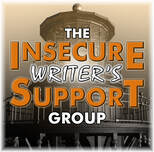 Every month, the Insecure Writers Support Group hosts a blog hop with an optional question meant to inspire and encourage other writers. Special thanks to founder Alex Cavanaugh and to this month’s co-hosts Kristina Kelly, Miffie Seideman, Jean Davis, and Liza @ Middle Passages. This month's questions is about artificial intelligence. Have you "played" with AI to write those nasty synopses, or do you refuse to go that route? How do you feel about AI's impact on creative writing? I dread writing synopses, but I haven’t used AI. Rather than give a personal opinion on this complicated topic, I’ll share two in-depth resources: Martha Brockenbrough’s upcoming book, Future Tense: How We Made Artificial Intelligence and How It Will Change Everything, and The Authors Guild Best Practices for Writers. One Last Thing.... For your listening pleasure, here’s a behind-the-scenes look at one of my favorite songs, Tom Petty’s "The Waiting". Today's productivity advice comes from writing coach Taryn Haas, discussing their compassionate method of creativity-related planning. Thanks, Taryn! Compassionate Planning for Writing Productivity by Taryn Haas Managing my creative life has always been a struggle. I’ve tried all sorts of methods -- a billion planners, fun stickers, AI scheduling apps, you name it. None of them truly stuck, and I always blamed it on myself. I wasn’t trying hard enough, I wasn’t following the flowery directions closely enough, I gave up too easily. I never took a moment to think about whether the methods were failing me, instead of the other way around. Weirdly, my day job helped me out. I took a class on Agile project management, which is very popular in the tech industry, and it felt good in a way no planner had. Almost immediately I began implementing it for my writing projects. Now I coach others on creating a similar system for managing their own projects, with certain core elements. Get the Tasks Out of Your Head Whatever medium you use to manage your tasks, like post-it notes or an app like Trello, get all of the to-do items out of your head. Have a space for these items to live, so that they aren’t taking up even more space in your head. They don’t have to be perfectly written out, it could just be a thought, but put it down. You can flesh them out later. Break Tasks Down Into Their Smallest Parts I can’t be the only one to have drastically underestimated the amount of time a task takes. I’m far more prone to do this when I write tasks in generalities; “revise manuscript,” “submit application,” “send out 5 queries”. If I look at those tasks phrased exactly like that, my brain is like cool, I can do all of that in a week or two. But let’s take a second to break down just the novel revision task. Revision is huge -- it’s re-reading, then analyzing, then puzzling out what to do, and then actually doing it. Even those can be broken down much farther, and the more you break it down, the more it becomes obvious that this is not a two week project (at least for me). Without breaking it down, I’m setting myself up for failure because I’m not acknowledging everything that goes into that work. All that to say, break your tasks down as far as makes sense. Get specific with them. Toss the Arbitrary Due Dates Ok, bear with me on this one because it seems scary BUT I’m convinced arbitrary due dates are not helpful. I say this as a writing-my-paper-the-morning-hours-before-it’s-due level procrastinator. So many planners had me create dates that I wanted to have something done by, whether it was a draft or a revision or a million other things. Nothing in that planning process considered what my life might actually be like in that time (to be fair, it can’t see the future). Maybe I’d end up switching jobs, or have a health issue. Inevitably, I missed a goal date. Then came the flood of shame, disappointment, and frustration, all directed inward. Now, I only set a due date for items that truly have one, like an application deadline, or when edits are due. My criterion is there has to be an externally-applied pressure or specific date to complete the thing. It can’t be me making up dates I have decided are when a thing should be done. Assign Effort Points I love checklists, and you’ll find them littered around my house. But I don’t use checklists for writing projects anymore. Why? Because one task is not equivalent to another in time and emotional drain. Now, I assign effort points to each task. This can be whatever you want, but I think the fibonacci sequence (1, 2, 3, 5, 8, 13) works well (don’t judge me!). For each task, I think about how much it will drain me both energy and time-wise. As an example, if I just have to change a character’s name, I might only give that 1 point -- it’s pretty easy, and doesn’t take much emotional effort to accomplish. On the other hand, writing a traumatic scene, even if it takes just as much time as changing the name, would probably get a 5. It tires me out far more than the name change does. It takes some time to get used to doing this and, inevitably, you’ll be wrong. However, looking at my week, thinking of how much I think I can handle given how busy (or not) I am, and then choosing the tasks to get done -- well, that all feels way more in sync with my life than following prompts that don’t know me at all. Those are the main points that have really helped my productivity and energy around creating. Now I create realistic goals with a much better understanding of each task and how much I can handle. It feels more honest and compassionate, which makes me more compassionate to myself and the way my brain both tracks everything but demands perfection.  More about Taryn: Taryn (they/them) is a Vermont writer with a passion for discovering what drives a story and the best ways to bring it out. They’ve written myriad genres, including fantasy, science fiction, and horror, and across formats and age ranges, from poetry to flash fiction to young adult to short stories. They have their MFA from Vermont College of Fine Arts in Writing for Children and Young Adults. When they’re not writing, they’re hanging out with their dogs, playing board games, climbing, or snowboarding. The StoryWilds is made up of Taryn Haas and Aurora Hurd. They are queer, neurodivergent writers who are looking to make writing and finishing stories with professional support within the reach of all who want it. By making the best parts of an MFA program available for a fraction of the cost in a more flexible format, their program is truly guided by you and your goals. Whatever those end goals are -- if you are just starting a story, struggling to finish one, or approaching the editing and querying process -- they are ready to meet you where you are to support and propel you toward it. 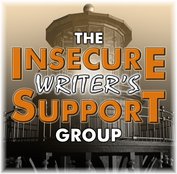 IWSG Blog Hop Every month, the Insecure Writers Support Group hosts a blog hop with an optional question meant to inspire and encourage other writers. Special thanks to founder Alex Cavanaugh and to this month’s co-hosts Janet Alcorn, SE White, Victoria Marie Lees, and Cathrina Constantine. This month's questions is about websites: What turns you off when visiting an author's website/blog? Lack of information? A drone of negativity? Little mention of author's books? Constant mention of books? It's not an author website, but one I adore is The StoryWilds (mentioned above). It's colorful and streamlined, and there's a simple elegance to it that I love. Happy Writing!
I recently had the joy of teaching a virtual workshop on my favoritie topic, Productivity for Creative People. Productivity for creatives isn't about efficiency, like getting more words written per hour. (Although sometimes that can be a result.) Instead, I like to look at productivity through the lens of how can we make the work of creating easier for ourselves? 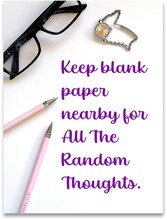 One small tip that can have a big impact when you're trying to focus: Have an empty pad of paper nearby to jot down all the thoughts that invade when you start to write. Think of a great gift idea for someone? Make a note. Realize the car is due for an oil change? Another note. Research needed for the story? Mark a place in the manuscript TBD (To Be Determined) and note what you need on a separate research list. This simple step keeps me much more focused on my work than if I try to remember All The Random Thoughts or stop for "just a minute" to look something up. (Because we all know how that ends up . . . .) 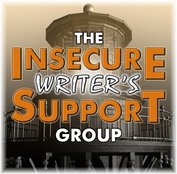 IWSG Monthly Blog Hop Every month, the Insecure Writers Support Group hosts a blog hop with an optional question meant to inspire and encourage other writers. Special thanks to founder Alex Cavanaugh and to this month’s co-hosts C. Lee McKenzie, JQ Rose, Jennifer Lane, and Jacqui Murray. This month's question: When you leave a book reviews do you review for the Reader or the Author? Is it about what you liked and enjoyed about your reading experience, or do you critique the author? I tend to be a positive book reviewer. If I don’t like a book, I typically don’t review it. Writing is hard work, and there’s enough negativity in the world without adding public criticism. How about you? How do you approach book reviews? "Your mind is for having ideas, not holding them."
~David Allen, Getting Things Done Happy Creating! We interrupt this regular blog to mention that registration is now open for my upcoming virtual NJ SCBWI workshop, all about productivity for creative people. It's online Wednesday, November 29th from 7 pm to 9 pm. Can't make it? No problem. Watch it when it's convenient for you for 30 days after the event. Workshop Description Yvonne distills practical and pivotal productivity research through the writer’s lens. This workshop offers actionable insights for applying productivity strategies to artistic efforts. Learn about developing a routine, planning your optimal week, improving focus, and using organizational tips and tools, all with the goal of making your creative life easier. Spend two hours in this workshop, gain back twenty.* *Estimated using non-patented productivity math. Results may vary. Email me with any questions. I hope to see you there! |
JOIN NOW!
Sign up for Yvonne's newsletter for exclusive content, book news, and other occasional author goodies. Archives
March 2025
Categories
All
|